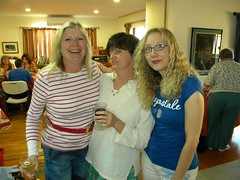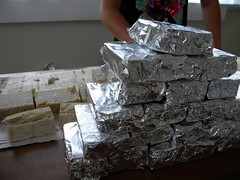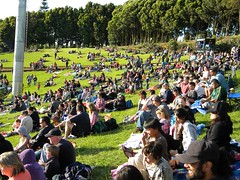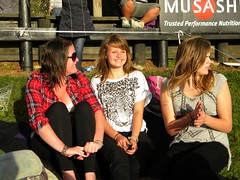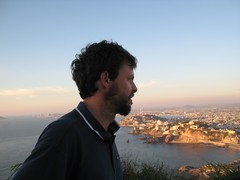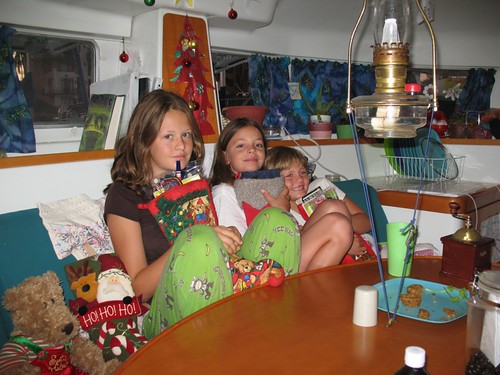This year, DrC and I have slipped gently, easily and comfortably into skeptism. Fortunately, skeptics can also be pagans as long as we don't actually have to believe in the Good Fairy, Mother Nature, or Any Other Capitalized Deity -- except, of course, the Flying Spaghetti Monster. We got to this point through a gentle but relentless campaign on the part of DrC's father in the realm of physics combined with beer... specifically Skeptics in the Pub. Through a friend (Steve) of a friend (alien), we met like-minded folk and starting thinking. Thinking is dangerous. Not thinking is also dangerous.
I love to mis-quote Einstein.
So in addition to the other wacky notions such as preparing for the pending zombie apocalypse, getting rid of all our stuff, and letting children play unsupervised on the deck of a boat, you can now add "ignoring the entire holiday season" to the list of Conger family transgressions on normal. We signalled our new conviction that Christmas is a waste of time, money, and emotional energy by getting in the van and driving off for three weeks. Turns out that in New Zealand, this is not a particularly radical notion. When Christmas and New Year fall gobsmack in the middle of summer, spending the two week holiday on the beach is pretty standard. I think DrC has us hiking up a mountain or repelling into a cave or something on Christmas Day. I had to remind him that the tour operators might be taking the day off.. you know... just for the heck of it? But turns out, not so much. Kiwis are pretty practical. Or they also agree that the reason for the season is to make money, a universal commercial consensus that appears to know no borders.
Before you go all "bah humbug" and presume to equate cynism with skepticism, I assure you that the Conger family plans to enjoy ourselves. Once again, we all made each other gifts to exchange on Yule as well as gathered little items for our Santa stocking stuffer extravaganza. DrC made soap this year, I made candy and rollagon organizers, Mera made pou (Maori dance balls), Aeron customized journals, and Jaime made designer t-shirts. I can't say we enjoy this process... inevitably Grandma Sue finishes in August, Mera in October, Aeron in November, DrC two weeks before Solstice, Toast the day before, and Jaime three weeks later. It's pretty stressful, to be honest. The competition. The pressure. The distilled sense of Obligation. On the other hand, it's only once a year. If this is what it takes to get the good doctor to make more soap, I think we're all willing to sacrifice.
This year's soap offering is oatmeal honey. Stuff smells fantastic and foams up nicely. Unfortunately, there is a bit too much oatmeal so it sort of falls apart when you use it. You have to gather it up and squish it back together again then set it on a dry spot in the shower until the next time. Soap -- With Instructions. For the first time, the soap is vegetarian made of canola oil rather than the usual lard. And as always, the only animals tested in the development process were our girls; They survived.
The stockings are hung
In the trailer with care
Stuffed with good candy
The children won't share
And wouldn't you know
The Congers are happy
Without all those trappings
Absent the sappy
We eat and we play
We hike and we swim
We drink large pint glasses
Filled up to the brim
And together each day
We thank fortune and fate
For the keys they have given us
To the happiness gate.
Enjoy the Holidays!
~ Toast
Showing posts with label holidays. Show all posts
Showing posts with label holidays. Show all posts
Thursday, December 23, 2010
Wednesday, November 10, 2010
Burning Guy
It turns out that one reason Halloween in New Zealand is so unsuccessful is that it immediately proceeds a far more important annual ritual: Guy Fawkes Day. If you are like me – an ignorant, unlettered American – you have probably never heard of Guy Fawkes. Or maybe you have, though in passing as you tried to decipher the messaging of that oddly fascinating Wachoswki movie V for Vendetta.
It's obvious why Kiwi's celebrate this holiday; It's a great excuse to drink a lot and blow shit up. Falling as it does at the beginning of the summer season, it's the ideal opportunity to kick off the holidays and the start of tramping season, vacations, and the pending consumptive Christmas extravaganza... with a bang, as it were. Everyone troops off to the nearest park or stadium at about five in the evening armed with chilly-bins, pavlovas, piss, lollies, sizzlers, and pies, children, chairs and grandparents. Some even haul out a couch. Then everyone nibbles and sips for hours while the bands play, the singers sing, the dancers dance, the kapa haka groups stomp and pound and the teenagers strut their teenage stuff. At dark, the stadium lights are doused and the fireworks begin.
New Zealanders see no reason to burn Guy, though. At least we didn't see a bonfire in Pukekohe. We spent the holiday this year with an Irish history teacher who was full of all sorts of interesting quotes and historical trivia. He noted that in his home country, bonfires are pretty much an essential component of the Guy Fawkes Holiday celebrations. But then again, unlike New Zealand, it is cold in the U.K. on November 5. Standing around the bonfire prevents spectators from freezing to death while waiting for the fireworks. Apparently, the tradition of burning a guy has been expanded in the U.K. to include the burning of just about any disliked public figure. There's a great quote in Wikipedia: “Effigies of other notable figures who have become targets for the public's ire, such as Paul Kruger and Margaret Thatcher, have also found their way onto the bonfires.” I admit to being highly tempted by the opportunity to burn in effigy a few public figures that have earned my own personal animus during the past year.
After the fireworks were over, slightly sunburnt, stuffed with food and good company, we trooped over to our friends' house and got quietly soused while the kids played Wii. The entire experience was like a Fourth of July celebration without the jingoism and Sousa marches and the addition of a haka and a rugby team autographing posters in the in-field. Just a word of advice to Americans moving to the antipodes – buy your fireworks in November if you plan on celebrating the “real fourth.” They don't sell them here in the winter.
“Remember, remember the Fifth of November,Apparently, it's not just the poet...no one knows a reason to forget this event. Certainly not the British or any of the residents of their commonwealth countries. Even after watching V for Vendetta – maybe because of that movie – it wasn't clear to me that Guy was The First Guy... the Guy who created the word 'guy.' Nor was it clear to me that he attempted to blow up the British Parliament in 1605. And it absolutely never occurred to my historically shallow American sensibilities that the English would still be blowing stuff up over four hundred years later to commemorate the thwarting of the Gun Powder Plot. Yes, as baffling as it seems, the English are still so pissed off at Guy, that they have been burning him in effigy for four centuries. Talk about holding a grudge.
The Gunpowder Treason and Plot,
I know of no reason
Why the Gunpowder Treason
Should ever be forgot.”
It's obvious why Kiwi's celebrate this holiday; It's a great excuse to drink a lot and blow shit up. Falling as it does at the beginning of the summer season, it's the ideal opportunity to kick off the holidays and the start of tramping season, vacations, and the pending consumptive Christmas extravaganza... with a bang, as it were. Everyone troops off to the nearest park or stadium at about five in the evening armed with chilly-bins, pavlovas, piss, lollies, sizzlers, and pies, children, chairs and grandparents. Some even haul out a couch. Then everyone nibbles and sips for hours while the bands play, the singers sing, the dancers dance, the kapa haka groups stomp and pound and the teenagers strut their teenage stuff. At dark, the stadium lights are doused and the fireworks begin.
New Zealanders see no reason to burn Guy, though. At least we didn't see a bonfire in Pukekohe. We spent the holiday this year with an Irish history teacher who was full of all sorts of interesting quotes and historical trivia. He noted that in his home country, bonfires are pretty much an essential component of the Guy Fawkes Holiday celebrations. But then again, unlike New Zealand, it is cold in the U.K. on November 5. Standing around the bonfire prevents spectators from freezing to death while waiting for the fireworks. Apparently, the tradition of burning a guy has been expanded in the U.K. to include the burning of just about any disliked public figure. There's a great quote in Wikipedia: “Effigies of other notable figures who have become targets for the public's ire, such as Paul Kruger and Margaret Thatcher, have also found their way onto the bonfires.” I admit to being highly tempted by the opportunity to burn in effigy a few public figures that have earned my own personal animus during the past year.
After the fireworks were over, slightly sunburnt, stuffed with food and good company, we trooped over to our friends' house and got quietly soused while the kids played Wii. The entire experience was like a Fourth of July celebration without the jingoism and Sousa marches and the addition of a haka and a rugby team autographing posters in the in-field. Just a word of advice to Americans moving to the antipodes – buy your fireworks in November if you plan on celebrating the “real fourth.” They don't sell them here in the winter.
Wednesday, December 31, 2008
Solstice on the High Seas
I can't remember if I've mentioned that the crew of s/v Don Quixote are pagans. Sorta. Actually, we are not a particularly religious group, but if we had to pick a religion it would most likely be environmental paganism. One of the many objectives for the trip that appears to be going bye bye was for us to get a bit more serious about this whole paganism thing. So far, we haven't made much progress.
The one holiday we do manage to celebrate with some degree of consistency each year is Yule. Also known as Winter Solstice, Yule is a new year celebration. If you have a scientific bent, it is a celebration of the longest night of the year, the shortest day, and the loop of the sun out of winter and towards spring. Those feeling more poetic can describe it as the death and re-birth of the Sun God.
Yule has been around for a very long time. Most of the traditions associated with the holiday are similar to the Christian holiday of Christmas that consumes the second half of December. Pagans and Christians can get into all sorts of chicken-and-egg battles over the various trappings of the end of year celebration; It does no good for a functional religious illiterate such as myself to weigh in on the subject. There are many great resources on the subject online if you care to do the research.
Probably the important thing to remember is that almost every major cultural group in the world finds a way to celebrate the longest night of the year and many of the activities we associate with Christmas pre-date the Christian church by hundreds -- sometimes thousands -- of years. For example, the "Romans celebrated the Winter Solstice with a festival called Saturnalia during which they decked their houses with boughs of evergreen trees and bushes. People gave each other presents, and all normal business was suspended and social distinctions were forgotten. Servants and slaves were given a feast by their masters who waited the tables. The Pagan Saxons celebrated the feast of Yule with plenty of ale and blazing fires, of which our Yule log is the last relic."* The Egyptians had some complicated Isis thing going on where she mourned the sun, and then the priests would come out in the middle of the night yelling about virgins and babies. But if you think that's weird, the one that makes me chuckle is a post-WWII Japanese tradition of waiting in line at KFC to get a bucket of fried chicken to feed the kids on the night that Uncle Chimney shows up with a million presents.
Of all the traditions, s/v Don Quixote's celebration is most like that of the Japanese. Traditionally, we would get a pizza delivered at about sunset. We "put out the hearth fires" by turning off the heat and all the lights. We gathered around a table in the living room, lit candles to the four elements as well a symbolic central home fire. We then wrote our regrets on small pieces of paper which we burned in the central flame. With no small amount of solemnity and giggling, we then put out the last of our hearth fires for the previous year, blowing out all the candles and plunging the family into darkness. Not even an ember carried our regrets into the new year. Every one settled down on cushions in the living room to sleep together until morning. At dawn, we would drive out to the West Seattle overlook and greet the sun with sun cookies and ringing bells.
That was then. Now, we do it differently. First, we can't put out the home fires... if we turn off our masthead light we are both wildly illegal and prone to getting run into by a drunk panga driver. Also, we don't have a living room. Probably most significantly, dawn is just a whole lot earlier in Mexico. So changes are necessary.
This year, we spent the day kicking around Mazatlan. In the evening, we climbed to the El Faro Lighthouse at about dusk. We cast our circle, burned our regrets, talked about what we want to take into the new year, then doused our little candle with a glass of wine. Then we tripped back down the hill. In the morning, we greeted the dawn with bells. Typically for our family, dawn was hidden in clouds. If we wait for the sun, this family will never get the new year started.
Whether you celebrate Christmas or Yule, Hanukkah, or Kwanzaa, the Conger family of s/v Don Quixote wish you a very healthy and happy new year. May you have fair winds, following seas, and the good fortune to enjoy the lights in the eyes of your loved ones.
* I found a great resource online about the history of Yule which I downloaded and quote from liberally. Unfortunately, the authors didn't put their names in the document, and I can't find it again to get the link. Such is the ephemeral and plagiaristic nature of the Internet.
The one holiday we do manage to celebrate with some degree of consistency each year is Yule. Also known as Winter Solstice, Yule is a new year celebration. If you have a scientific bent, it is a celebration of the longest night of the year, the shortest day, and the loop of the sun out of winter and towards spring. Those feeling more poetic can describe it as the death and re-birth of the Sun God.
Yule has been around for a very long time. Most of the traditions associated with the holiday are similar to the Christian holiday of Christmas that consumes the second half of December. Pagans and Christians can get into all sorts of chicken-and-egg battles over the various trappings of the end of year celebration; It does no good for a functional religious illiterate such as myself to weigh in on the subject. There are many great resources on the subject online if you care to do the research.
Probably the important thing to remember is that almost every major cultural group in the world finds a way to celebrate the longest night of the year and many of the activities we associate with Christmas pre-date the Christian church by hundreds -- sometimes thousands -- of years. For example, the "Romans celebrated the Winter Solstice with a festival called Saturnalia during which they decked their houses with boughs of evergreen trees and bushes. People gave each other presents, and all normal business was suspended and social distinctions were forgotten. Servants and slaves were given a feast by their masters who waited the tables. The Pagan Saxons celebrated the feast of Yule with plenty of ale and blazing fires, of which our Yule log is the last relic."* The Egyptians had some complicated Isis thing going on where she mourned the sun, and then the priests would come out in the middle of the night yelling about virgins and babies. But if you think that's weird, the one that makes me chuckle is a post-WWII Japanese tradition of waiting in line at KFC to get a bucket of fried chicken to feed the kids on the night that Uncle Chimney shows up with a million presents.
Of all the traditions, s/v Don Quixote's celebration is most like that of the Japanese. Traditionally, we would get a pizza delivered at about sunset. We "put out the hearth fires" by turning off the heat and all the lights. We gathered around a table in the living room, lit candles to the four elements as well a symbolic central home fire. We then wrote our regrets on small pieces of paper which we burned in the central flame. With no small amount of solemnity and giggling, we then put out the last of our hearth fires for the previous year, blowing out all the candles and plunging the family into darkness. Not even an ember carried our regrets into the new year. Every one settled down on cushions in the living room to sleep together until morning. At dawn, we would drive out to the West Seattle overlook and greet the sun with sun cookies and ringing bells.
That was then. Now, we do it differently. First, we can't put out the home fires... if we turn off our masthead light we are both wildly illegal and prone to getting run into by a drunk panga driver. Also, we don't have a living room. Probably most significantly, dawn is just a whole lot earlier in Mexico. So changes are necessary.
This year, we spent the day kicking around Mazatlan. In the evening, we climbed to the El Faro Lighthouse at about dusk. We cast our circle, burned our regrets, talked about what we want to take into the new year, then doused our little candle with a glass of wine. Then we tripped back down the hill. In the morning, we greeted the dawn with bells. Typically for our family, dawn was hidden in clouds. If we wait for the sun, this family will never get the new year started.
Whether you celebrate Christmas or Yule, Hanukkah, or Kwanzaa, the Conger family of s/v Don Quixote wish you a very healthy and happy new year. May you have fair winds, following seas, and the good fortune to enjoy the lights in the eyes of your loved ones.
* I found a great resource online about the history of Yule which I downloaded and quote from liberally. Unfortunately, the authors didn't put their names in the document, and I can't find it again to get the link. Such is the ephemeral and plagiaristic nature of the Internet.
Subscribe to:
Posts (Atom)

